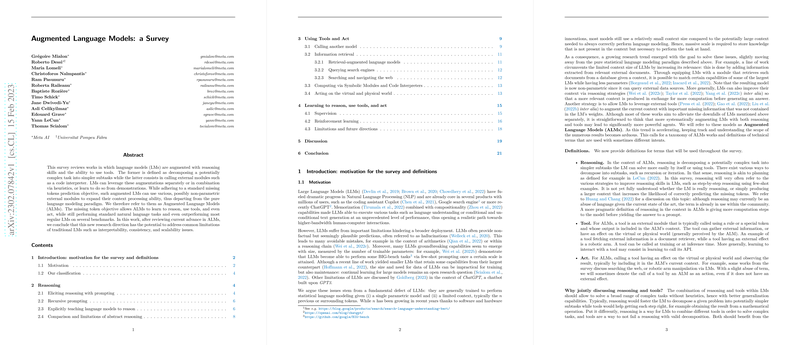An Overview of Augmented LLMs
The paper "Augmented LLMs: a Survey" offers an extensive examination of the methodologies and technologies devised to enhance the abilities of LLMs by integrating reasoning skills and tool usage, resulting in what the authors term as Augmented LLMs (ALMs). The paper navigates through the current landscape of research focusing on improving the interpretability, consistency, and scalability of LMs, providing insights into the potential this new research direction holds for addressing some of the inherent limitations of conventional models.
Introduction and Motivation
LLMs, due to their sheer size and advanced natural language processing capabilities, have revolutionized tasks such as language understanding and text generation. Nevertheless, they are not without their drawbacks, notably the tendency to produce hallucinations and inconsistent outputs, largely attributed to their training paradigm focused on statistical LLMing within a constrained context. The introduction of ALMs seeks to transcend these limitations by enhancing LLMs with non-parametric external modules that improve reasoning and tool-utilization capabilities, thereby offering a more robust framework for developing intelligent systems that exhibit concise, grounded, and action-oriented results.
Reasoning Enhancements
The paper underscores various approaches to bolster reasoning within LMs. A prominent method involves Chain-of-Thought (CoT) prompting, which encourages models to delineate intermediate reasoning steps before arriving at the final answer, showing remarkable improvements in reasoning tasks. Meanwhile, recursive prompting and explicitly teaching intermediate reasoning steps have emerged as effective strategies to enhance the model’s ability to decompose complex tasks into tractable subtasks. Despite these advancements, challenges remain—particularly in ensuring that LMs truly leverage these intermediate steps for logical deliberation rather than merely increasing the likelihood of correct token prediction.
Tool Utilization and Action Potential
Extending the capabilities of LMs through tool integration forms a central thesis of the survey. By harnessing external modules like code interpreters and search engines, ALMs can execute complex operations beyond the scope of their weights, thus surpassing traditional models on several benchmarks. The paper explores diverse applications, from document retrieval augmenting capacity to symbolic reasoning enhancements enabled by code execution. The ability to act, especially in dynamic environments such as web navigation or robotic control, highlights a nuanced capability where LMs not only infer but also impact the external world, broadening their applicability significantly.
Supervision and Learning Paradigms
Methods to instill these reasoning and tool-using enhancements range from few-shot prompting and bootstrapping to fine-tuning with reinforced learning from human feedback. The survey emphasizes the potential of these methods in both developing and honing the augmented feature sets of LMs, yet acknowledges the challenges posed by the dependence on large-scale data and high computational resources, a pervasive issue in contemporary AI research.
Implications and Future Directions
The development of ALMs signals a potential recalibration of the role LMs play across various domains by offering a hybridized approach to model architecture that balances memorized knowledge with active content acquisition. While ALMs illuminate a pathway toward more autonomous and capable agents, ethical concerns about trustworthiness and the transparency of augmented capabilities persist, requiring continued scrutiny and evaluation.
In conclusion, "Augmented LLMs: a Survey" presents a comprehensive outlook on contemporary research efforts to enhance LMs. By charting the advances and outlining future research trajectories, it sets the stage for significant evolution in AI models' capabilities, encouraging further exploration into creating more integrated, reliable, and expansive LLMs that leverage augmented reasoning and tool utilization. The prospects of ALMs indeed suggest profound implications for the future development of intelligent systems able to undertake intricate human-computer interactions with enhanced efficacy and reliability.
